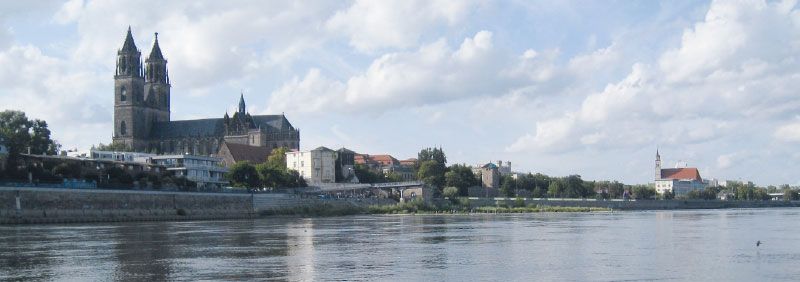In Magdeburg on 16th January 2024, the handover ceremony took place of the presidency of the International Commission for the Protection of the Elbe River (ICPER). The Czech Republic took over from the Federal Republic of Germany for the next three years. Ing Tomáš Fojtík, who is Director of T. G. Masaryk Water Research Institute (TGM WRI), was appointed as the new president with the agreement of the contracting parties. The TGM WRI employees are internationally recognized and long-term leaders, spokespeople, and members of working groups and expert groups, who significantly participate in the Commission’s activities and direction. This fact underlines the significance and importance of this research organization of the Ministry of the Environment as well as the actual research. Since the ICPER establishment in 1990, Ing. Tomáš Fojtík is the fifth president of the Commission from the Czech Republic.

Fig. 1. The Elbe river in Děčín, the Thun-Hohenstein castle and the Tyrš bridge arch (Photo: D. Fiala)
The task of the new president will be to support the activities of working groups and expert groups within the ICPER, especially in the implementation of the EU Water Framework Directive and the Floods Directive. He will also focus on the issue of sediments and nutrients and the development of the International Elbe Monitoring Programme, the International Elbe Warning and Alarm Plan, and the Special International Elbe Monitoring Programme for monitoring water quality in the event of an extreme hydrological situation.
Ing Tomáš Fojtík says to his appointment: “For me, the appointment to the position of the ICPER president is a great honour, but also a commitment. International cooperation has always been important to me, because only through it can we contribute to the overall improvement of the environment. Our efforts in this area should have no boundaries because water does not know them either.”
Although this year ICPER only organizes internal events, in 2025 it is planning to hold two important water management events aimed at the general public as well. The first is the International Elbe Forum, which will be held in Ústí nad Labem on 2–3 April 2025. The Elbe Forum aims to support the compilation of the International Management Plan for the Elbe River Basin District and at the same time contributes to mediating planning results and their implementation. Since 2013, the Forum has also been used for the implementation of the Floods Directive and the elaboration of the International Flood Risk Management Plan for the Elbe River Basin District. The second important event, which will take place in 2025 under the Czech Republic’s presidency, is Magdeburg Seminar on Water Protection. It was first held in Magdeburg in 1988, and since 1992 it has been held alternately in the Czech Republic and Germany. Over the years, it has gained a reputation as one of the most important professional and scientific events in the field of water protection in the Elbe basin. The attractiveness of the seminar is evidenced by the number of active participants. In 2023 alone, 190 interested parties from the Czech Republic and Germany accepted the invitation. The Magdeburg Seminar on Water Protection 2025 will be held on 8–9 October.

Fig. 2. The Magdeburg Cathedral on the sandstone rock Domfelsen, which forms the dreaded rapids in the Elbe river (Photo: D. Fiala)
Source: www.ikse-mkol.org/cz/
ICPER was founded on 8th October 1990. In addition to the Czech Republic and the Federal Republic of Germany, the founding and contracting parties also include the European Union, which was a contracting party to the ICPER until 30th April 2004; that is, until the date of the Czech Republic‘s entry into the European Union on 1st May 2004. The main goals of ICPER activities are water use, primarily enabling drinking water from bank infiltration and agricultural use of water and sediments, achieving the most natural ecosystem possible with a healthy abundance of species and, last but not least, permanently reducing the load on the North Sea from the Elbe basin.
This informative article has not been peer-reviewed.
